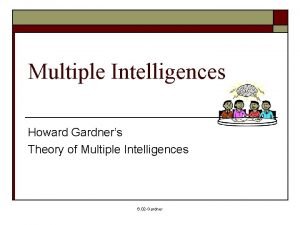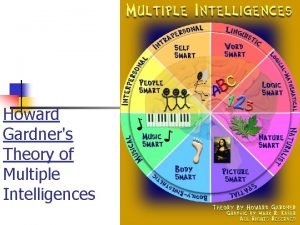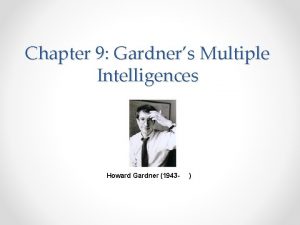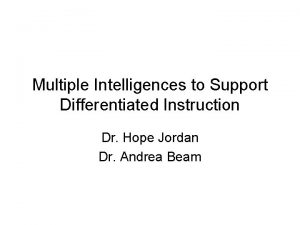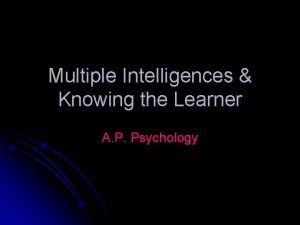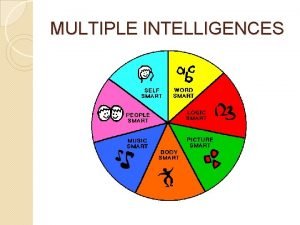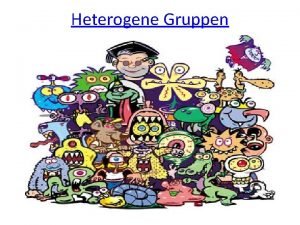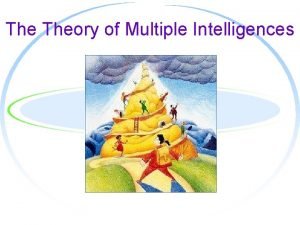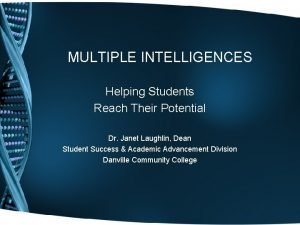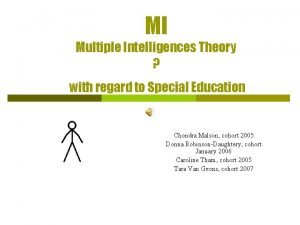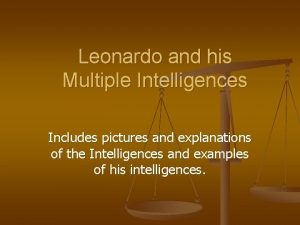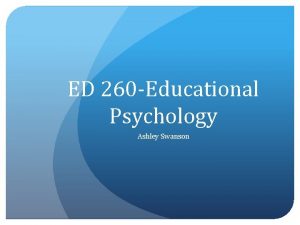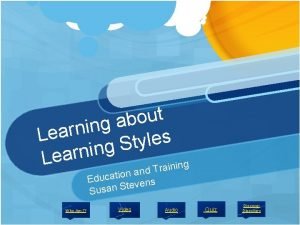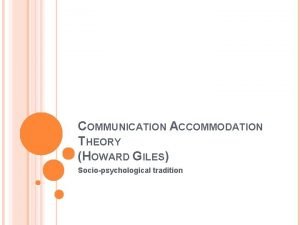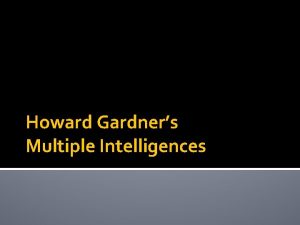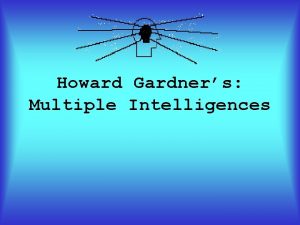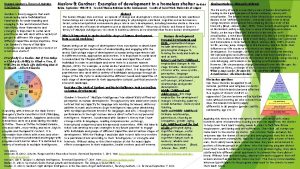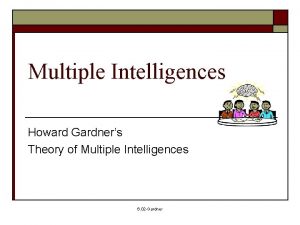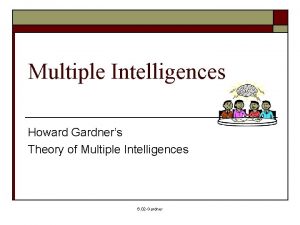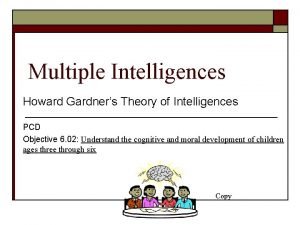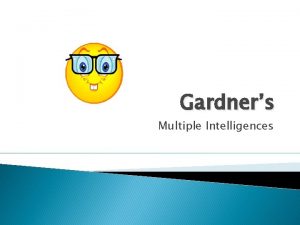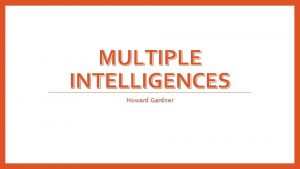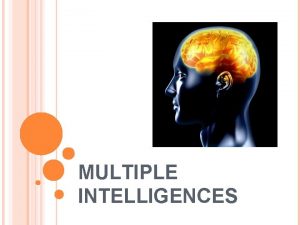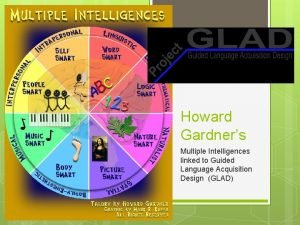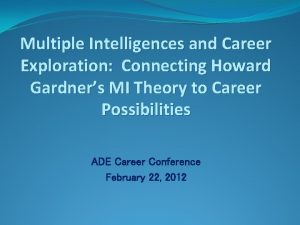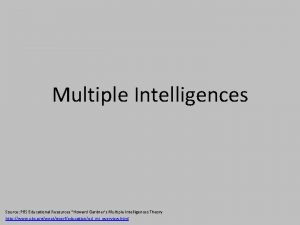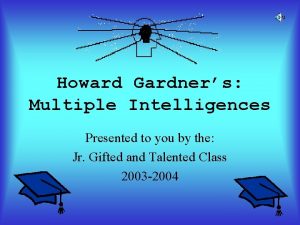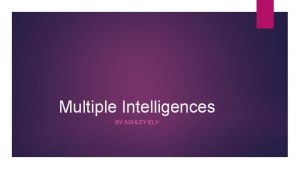Multiple Intelligences Howard Gardners Theory of Multiple Intelligences

















- Slides: 17

Multiple Intelligences Howard Gardner’s Theory of Multiple Intelligences 6. 02 -Gardner

Howard Gardner “I want my children to understand the world, but not just because the world is fascinating and the human mind is curious. I want them to understand it so that they will be positioned to make it a better place. Knowledge is not the same as morality, but we need to understand if we are to avoid past mistakes and move in productive directions. An important part of that understanding is knowing who we are and what we can do. . . Ultimately, we must synthesize our understandings for ourselves. The performance of understanding that try matters are the ones we carry out as human beings in an imperfect world which we can affect for good or for ill. ” (Howard Gardner, 1999) The multiple intelligences theory provides a new definition of cognitive human nature. According to Gardner, humans are organisms who possess a basic 6. 02 -Gardner set of intelligences.

o People have a unique blend of intelligences. Our greatest challenge is how to use the blend of intelligences. 6. 02 -Gardner

Eight Multiple Intelligences o o o o Verbal linguistic Logical-mathematical Spatial Musical rhythmic Bodily-kinesthetic Interpersonal Intrapersonal Naturalist 6. 02 -Gardner

Linguistic intelligence o o o Sensitive to spoken & written language Has ability to learn languages Uses language to accomplish goals Uses language as a means to remember information Examples: writers, poets, lawyers and speakers 6. 02 -Gardner

Logical-mathematical intelligence o o o Able to analyze problems logically Carries out mathematical operations Investigates issues scientifically Able to detect patterns Able to reason & think logically This intelligence is most often associated with scientific and mathematical thinking 6. 02 -Gardner

Spatial intelligence o Recognizes & uses the patterns or shapes in open space & in confined areas o Examples: architects, designers, engineers, employees of moving companies, retailers, etc. 6. 02 -Gardner

Musical intelligence o o o Skill performing, composing, & appreciating musical patterns Able to recognize & compose musical pitches, tones, and rhythms Note: (according to Howard Gardner) musical intelligence runs in an almost structural parallel to linguistic intelligence. 6. 02 -Gardner

Bodily-kinesthetic intelligence o o Using one's body or parts of the body to solve problems Using mental abilities to coordinate bodily movements Howard Gardner sees mental and physical activity as related. Examples: athletes, dancers, actors 6. 02 -Gardner

Interpersonal intelligence o o o Able to understand intentions, motivations and desires of other people Able work effectively with others Examples: Educators, salespeople, religious and political leaders, and counselors all need a well-developed interpersonal intelligence. 6. 02 -Gardner

Intrapersonal intelligence o Ability to understand oneself, to appreciate one's feelings, fears and motivations o Involves having an effective working model of ourselves, and to be able to use such information to regulate our lives. 6. 02 -Gardner

Naturalist intelligence o o Ability to make consequential distinctions in nature —between one plant and another, among animals, clouds, mountains, and the like. Scientist Charles Darwin had high naturalist intelligence. Most of us no longer use our naturalist intelligence to survive in the jungle or the forest. Our consumer culture is based on our naturalist to differentiate one car make from another, one sneaker from another, and the like. 6. 02 -Gardner

o Gardner said the eight intelligences rarely operate independently. o Multiple intelligences are used at the same time & complement each other as people develop skills or solve problems. 6. 02 -Gardner

o These intelligences, according to Howard Gardner, can be put to constructive or destructive (amoral) use. 6. 02 -Gardner

o Eight kinds of intelligence would allow eight ways to teach, rather than one. o This would allow children more ways to learn and express themselves. 6. 02 -Gardner

Review List the eight intelligences and give an example of each. Go to http: //www. bgfl. org/bgfl/custom/resources_ft p/client_ftp/ks 3/ict/multiple_int/index. htm To find out your multiple intelligences. Email yourself a hard copy, print it off for homework and bring it to class tomorrow. 6. 02 -Gardner

Credits: State of North Carolina FCS 6. 02 -Gardner
 Howard gardners theory of multiple intelligences
Howard gardners theory of multiple intelligences Gardners multiple intelligence test
Gardners multiple intelligence test Howard gardner 9 intelligences
Howard gardner 9 intelligences Multiple intelligences and differentiated instruction
Multiple intelligences and differentiated instruction Howard gardner ap psych
Howard gardner ap psych Bgfl multiple intelligence test
Bgfl multiple intelligence test Extracurricular activities
Extracurricular activities Montessori for multiple intelligences
Montessori for multiple intelligences Gardner's multiple intelligences
Gardner's multiple intelligences Intarpersonal intelligence
Intarpersonal intelligence Multiple intelligences in the classroom
Multiple intelligences in the classroom Multiple intelligences
Multiple intelligences Leonardo da vinci spatial intelligence
Leonardo da vinci spatial intelligence Learner centered pedagogy
Learner centered pedagogy Multiple intelligences musical
Multiple intelligences musical Multiple intelligences and learning styles
Multiple intelligences and learning styles Www. edutopia.org/multiple-intelligences-introduction
Www. edutopia.org/multiple-intelligences-introduction Accommodation theory howard giles
Accommodation theory howard giles
